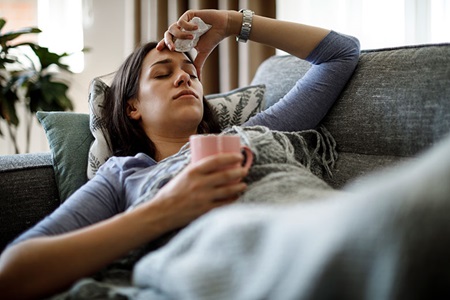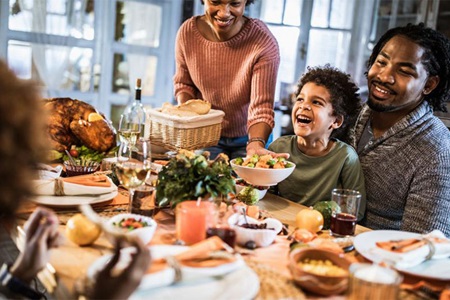Drinking & Type 1: Four Tips for Making It Through the Holidays
Drinking Safely with Diabetes
Somewhere between Thanksgiving and New Year’s Day, you might have one too many drinks. If you have type 1 diabetes, there’s no reason you can’t drink. So, we sat down with Erin Kelly RN, BSN, Certified Diabetes Care and Education Specialist (CDCES) in the Adult Clinic at Joslin Diabetes Center for recommendations on how people with type 1 diabetes can safely enjoy a drink on any occasion.
“For people with type 1 diabetes, alcohol can be tricky in terms of diabetes management,” says Kelly. “While we don’t recommend avoiding alcohol altogether, the message we always give is to be cautious. The most common concern with drinking alcohol is hypoglycemia.”
Here, Kelly shares a few suggestions on how to keep your glucose levels out of the danger zone.
Learn How Quantity Affects You
Alcohol can affect people differently. If you don’t have a handle on your pattern, it’s a good idea to do a test run at home. So have a drink or two with dinner one night then check your glucose levels more frequently over the next 24 hours,” says Kelly. Pay attention to what happens in that controlled situation.
“Some people see that lowering glucose effect after one drink, especially when paired with other factors like earlier activity or a light or missed meal, so you should use caution when taking insulin due to the potential for alcohol to lower your blood glucose later,” says Kelly.
Whether you take a bolus insulin to cover the extra carbohydrates in drinks really depends on many factors: the type and amount of alcohol you’re consuming, over what time period, how much you weigh, and what you will be eating. Remember, all alcohol, whether it contains carbohydrates or not, can actually lower blood sugar several hours after it’s consumed, especially for people with type 1 diabetes.
For women, the rule of thumb, explains Kelly, is that if you are going to have more than two drinks you should take less insulin than you normally would, or not take mealtime insulin at all. For women, more than two drinks will, in general, decrease your glucose sugar level in the hours to come. For men, it’s three or four drinks that necessitate a change in insulin plans.
Think About What You Drink
Some alcoholic drinks have carbohydrates (such as beer and sweetened mixed drinks) and some don’t. If the drink has carbohydrates, like anything else, it will cause your blood sugar to rise.
“What always surprises people is that wine doesn’t have a lot of carbohydrates, it only has three or four grams of total carbohydrates per glass, certainly that can be a way of having a drink without worrying about spiking your blood sugar,” says Kelly.
Another way to enjoy a drink without concern that the carbohydrates will spike your blood sugar is to stick with spirits — vodka, whisky or rum — because they contain zero carbohydrates. Don’t add a mix that has carbs and you can remain alcohol carb free - for example, rum mixed with diet coke or vodka and sugar-free cranberry juice.
Wine or hard alcohol in moderation will not dramatically influence your glucose levels, she says. However, if you do overindulge, those alcoholic choices might cause problems later, you won’t get a bump in your glucose levels, but you will get the lowering effect from the excess alcohol, sometimes well into the next day.
Above all, never drink and drive!
Eat Beforehand
What you eat before, during and after you drink could make it easier to keep your glucose levels in check. If you are going to a cocktail hour serving only hors d’oeuvres you might not get the right balance from healthy fat and protein, which helps stabilize blood sugar, so the alcohol may have a stronger effect on your glucose levels than if you had two or three glasses of wine with a big meal. Try drinking slowly and alternating a glass of water with every drink to lessen the alcohol’s impact.
If eating a large meal during drinking you may see a rise in your glucose levels from the carbs in the meal and that may be enough to offset the lowering effect from the alcohol. Use caution and practice when dosing for meals and adjusting for the alcohol effect.
Check Your Glucose Levels Frequently
If you’re going to toast to the New Year, remember to test your glucose levels before, during and after you drink. Most celebrating tends to occur in the evening so if alcohol is going to lower your blood sugar, it’s probably going to happen when you are sleeping.
At night, always check your glucose level before going to sleep. You might need to have a snack, take less of your long-acting insulin, or turn down the basal rate in your pump, all things that will help protect you from hypoglycemia in that overnight period, says Kelly. Ultimately it’s better to have slightly higher glucose levels while under the influence of alcohol than low glucose values. Your ability to sense lows, respond effectively and prevent them is impaired when you’re impaired from alcohol. A higher glucose level the next morning is fixable, and safer than risking a low overnight.
Although this content is reviewed by Joslin Diabetes Center healthcare professionals, it is not intended to replace the medical advice of your doctor or healthcare provider. Please consult your healthcare provider for advice about a specific medical condition.




